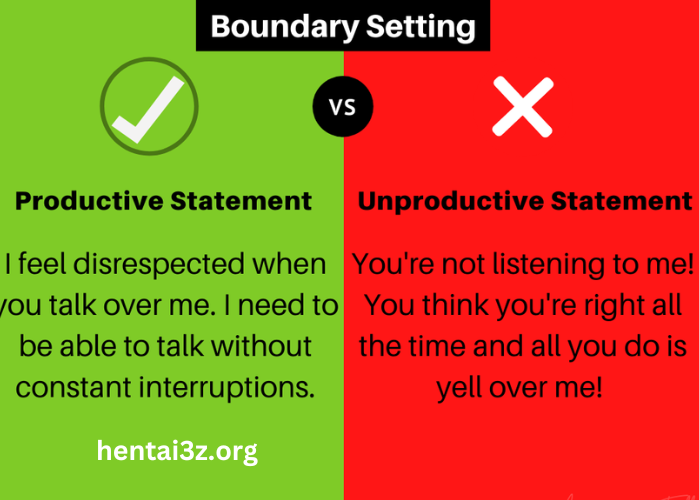Sibling relationships can be some of the most rewarding and complex connections we’ll ever have. While the bond between siblings is often unbreakable, it can also be a source of tension, conflict, and the need for clear boundaries. Establishing healthy boundaries with your sibling is essential for maintaining a positive, supportive, and mutually respectful relationship.
In this comprehensive guide, we’ll explore the signs that boundaries may be needed, provide practical tips for setting and communicating those boundaries, and offer strategies for dealing with resistance or pushback from your sibling. By the end, you’ll have the tools and confidence to establish and maintain healthy boundaries in your sibling relationship.
Signs that Boundaries May Be Needed in Your Sibling Relationship
- Constant Interference or Unsolicited Advice: Does your sibling frequently interject their opinions or try to control your decisions, even when you haven’t asked for their input?
- Lack of Personal Space or Privacy: Do you feel like your sibling is constantly in your business, borrowing your belongings without permission, or failing to respect your need for alone time?
- Emotional or Financial Dependency: Is your sibling overly reliant on you for emotional support or financial assistance, to the point where it’s becoming draining or unhealthy?
- Disrespectful Communication: Does your sibling often use hurtful language, make demeaning comments, or fail to listen to your perspective?
- Unequal Responsibilities or Expectations: Does your sibling expect you to take on a disproportionate share of family duties or hold you to different standards than they hold themselves?
If you’ve experienced any of these scenarios, it may be time to consider establishing healthier boundaries with your sibling.
Tips for Setting Boundaries with Your Sibling
- Reflect on Your Needs: Take some time to think about the specific boundaries you need to set. What behaviors or actions from your sibling are you no longer willing to tolerate? What do you need to feel respected, supported, and in control of your own life?
- Communicate Clearly and Calmly: When discussing boundaries with your sibling, choose a time when you’re both calm and receptive. Clearly explain your needs, use “I” statements to avoid blame, and be prepared to listen to their perspective as well.
- Be Specific and Consistent: Don’t leave any room for ambiguity. Clearly define the boundaries you’re setting, the reasons behind them, and the consequences if those boundaries are crossed.
- Stand Firm: Be prepared to enforce your boundaries if necessary. Your sibling may try to push back or test the limits, but it’s important to remain resolute and follow through with any consequences you’ve outlined.
- Revisit and Adjust: Boundaries may need to evolve over time as your relationship and needs change. Regularly check in with your sibling to reevaluate the boundaries and make any necessary adjustments.
Communication Strategies for Effectively Establishing Boundaries
- Use “I” Statements: Instead of saying “You always do this,” try “I feel [emotion] when [behavior] happens.” This helps your sibling understand your perspective without feeling attacked.
- Listen and Validate: Make an effort to hear your sibling’s side of the story and validate their feelings, even if you ultimately disagree. This can help them feel heard and more open to your perspective.
- Propose Solutions: Rather than just stating the problem, offer potential solutions or compromises that could work for both of you. This collaborative approach can lead to a more positive outcome.
- Timing is Everything: Choose a time to discuss boundaries when you’re both calm and receptive. Avoid bringing it up in the heat of an argument or when emotions are running high.
- Seek Neutral Ground: If you’re having trouble communicating effectively one-on-one, consider involving a neutral third party, such as a family therapist or mediator, to help facilitate the conversation.
Dealing with Resistance or Pushback from Your Sibling
- Expect Resistance: Your sibling may not immediately accept the boundaries you’ve set. They may try to argue, guilt-trip, or manipulate you into changing your stance.
- Remain Calm and Confident: When your sibling pushes back, resist the urge to engage in a heated debate. Stick to your boundaries and respond with empathy and composure.
- Reinforce the Reasons: Remind your sibling of the reasons behind the boundaries you’ve set and how they ultimately benefit the relationship.
- Set Consequences: If your sibling continues to disrespect your boundaries, be prepared to follow through with the consequences you’ve outlined, such as limiting contact or refusing to engage in certain behaviors.
- Seek Support: Don’t be afraid to enlist the help of other family members, a therapist, or even legal authorities if your sibling’s behavior becomes abusive or threatening.
Maintaining and Reinforcing Boundaries in Your Sibling Relationship
- Be Consistent: Consistently enforcing your boundaries is key to making them stick. Don’t make exceptions or allow your sibling to cross the line, even if they seem to be “trying.”
- Communicate Regularly: Regularly check in with your sibling to reevaluate the boundaries and make any necessary adjustments. This helps ensure that the boundaries remain relevant and effective.
- Celebrate Progress: Acknowledge and celebrate any positive changes or improvements in your sibling’s behavior. This reinforces the value of the boundaries you’ve set.
- Lead by Example: Demonstrate the kind of respectful, compassionate behavior you’d like to see from your sibling. Model the communication and conflict-resolution skills you’re hoping they’ll adopt.
- Seek Outside Support: If you’re struggling to maintain boundaries or your sibling’s behavior becomes overwhelming, don’t hesitate to seek help from a therapist, counselor, or other trusted third party.
Seeking Outside Help or Support if Necessary
In some cases, establishing and maintaining healthy boundaries with a sibling may require the assistance of a professional. If you find that your sibling’s behavior is becoming abusive, manipulative, or detrimental to your mental health, consider reaching out to a family therapist or counselor who can help facilitate constructive conversations and provide guidance on managing the relationship.
Additionally, if your sibling is unwilling to respect your boundaries or continues to cross the line, you may need to involve other family members, trusted friends, or even legal authorities to ensure your safety and well-being.
Remember, you deserve to have healthy, supportive relationships in your life. Don’t be afraid to advocate for yourself and seek the help you need to establish and maintain the boundaries that are right for you.
Conclusion and Final Thoughts
Establishing healthy boundaries with your sibling is a crucial step in maintaining a positive, mutually respectful relationship. By recognizing the signs that boundaries are needed, communicating your needs clearly, and consistently enforcing those boundaries, you can create a foundation of trust, understanding, and personal growth.
Remember, setting boundaries is an act of self-care and self-respect. It’s not about cutting your sibling out of your life, but rather about creating a healthier, more balanced dynamic that benefits you both. With patience, empathy, and a commitment to your own well-being, you can navigate the complexities of your sibling relationship and build a stronger, more fulfilling connection.




